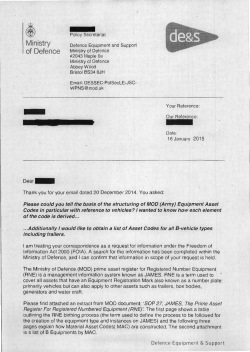
Guide to Aptitude Testing for Joining the ADF
ADF-RECREF132 ***All documents not on the DFR Intranet are uncontrolled*** Revised 02 April 2014 A Guide to Aptitude Testing for Joining the ADF This guide seeks to provide you with an overview of the psychological testing process that you will undertake when applying to join the ADF. The ADF psychological testing process includes: A General Ability Test; and A Mathematical Ability Test. Depending on the role applied for, you may also be required to sit additional testing, such as: Testing for Officer entry; Testing for Aircrew and Aviation related roles; and Testing for Other Specialist Occupations. This guide will provide you with an idea of what to expect during psychological testing, and hints and tips to help prepare you for this testing. What is psychological testing? The aim of psychological testing is to determine what skills and abilities candidates have and then to match the ADF jobs that require these same sets of skills and abilities. The psychological testing process During the psychological testing sessions you will be asked to answer a series of questions within a restricted period of time. You should attempt to get as many questions correct as possible in the time allowed. All tests include questions that range from the relatively straightforward to others that are quite difficult. Psychological testing can be administered either by computer, or in paper-and-pencil format. We hope that most applicants will feel comfortable completing the computer-based versions of the tests. However, if you are not comfortable using computers, and would prefer to complete the paper-and- pencil tests instead, you will be permitted to do so. Instructions will either be read to you before you begin each test, or included as an introduction where testing is done on a computer. Listen carefully to the instructions, and feel free to ask the test room supervisor questions if you are not sure what to do. Ensure that you read the question carefully and understand what you are being asked to do. You must give only one answer per question, except where specifically told otherwise. This document is provided by Defence Force Recruiting (DFR). Contact your Case Manager on 13 19 02 for any enquiries. Page: 1 of 6 Revision date 02 April 2015 ADF-RECREF132 ***All documents not on the DFR Intranet are uncontrolled*** Revised 02 April 2014 What can you take into the room? You will be able take your personal belongings into the room. However, you must turn off all electronic equipment, including your mobile phone. You are not allowed the use of a calculator or a dictionary of any variety during any of the psychological tests. You are not permitted to use any material that may aid or advantage you when completing the tests, and if you are found using these, your test scores will not be deemed valid. During the test session you will be provided with pencils, an eraser, and writing paper. Please remember to bring your reading glasses on the day to assist you in reading the computer screen or printed test material. Preparing You for Testing Below are some ideas that may help you prepare for psychological tests. Preparation Resources You may find attempting practice questions to be useful. This guide has some practice questions in Annex A. In addition to the questions provided in this guide, practice tests containing test items similar to those used by the ADF can be obtained from bookstores, your local library, and online from test publishers. Preparation Tips The following are a few tips to help you prepare: If you find you are having trouble with particular types of practice items (e.g. maths, language), you may wish to seek assistance from friends, tutors, or books; Do not attempt to prepare in one big session the night before you are due to undergo testing. Try to space your study periods out (e.g. an hour a day); and While preparing, don’t simply read over information, practice recalling and using it. Attempt to test yourself on how much you have learnt wherever possible. This may also help you identify areas in which you need further practice. On the day of testing you should plan to arrive at the Defence Recruiting testing area well rested, in good health, and with plenty of time so you are not rushed. Test Taking Instructions Before you start the test: Listen carefully to the instructions given by the test supervisor; Read the test instructions very carefully. If you have any questions, make sure you ask the test supervisor before you start the test. Once the test starts: Read every question carefully and ensure you understand what you are required to do; and Work as quickly and as accurately as you can. This document is provided by Defence Force Recruiting (DFR). Contact your Case Manager on 13 19 02 for any enquiries. Page: 2 of 6 Revision date 02 April 2015 ADF-RECREF132 ***All documents not on the DFR Intranet are uncontrolled*** Revised 02 April 2014 For multiple choice tests: Read all the possible answers before selecting one; Ensure that the question you are marking on the answer sheet matches the one you are intending to answer in the question booklet; Give only one answer per question (except where specifically instructed otherwise); and If you make a mistake with paper and pencil tests, rub it out with your eraser or using the method demonstrated by the test supervisor. Summary The outcome of your testing will provide Defence Force Recruiting a deeper understanding of your aptitudes/abilities and underlying knowledge, so that they can assist you in identifying an occupation for which you are best suited. Although some candidates might not obtain high enough scores for the occupation they most prefer, most will find that they are suitable for some form of employment within the ADF. All candidates, including those who do not achieve high enough scores for their preferred occupation, but who still wish to serve in the ADF in some capacity, will receive career information from a Career Counsellor / Case Manager regarding their chosen career. Or, alternatively, assistance in identifying another job for which they might be better suited. The strategies and examples in this guide are provided to both familiarise you to the ADF testing process as well as reduce any test anxiety you may be experiencing. It is anticipated that you find the guide useful in your test preparation. This document is provided by Defence Force Recruiting (DFR). Contact your Case Manager on 13 19 02 for any enquiries. Page: 3 of 6 Revision date 02 April 2015 ADF-RECREF132 ***All documents not on the DFR Intranet are uncontrolled*** Revised 02 April 2014 Appendix A Sample Questions General Ability Test The following are examples of the type of questions you can expect to see in the General Ability Test. Answers are provided at the end of this appendix. 1. Arithmetic Question: Give the number that corresponds with the question mark (?) in the following addition problem: 6 8 + 7 ? 1 ? 2 2. Arithmetic Question: How many pieces of paper, each costing 20 cents, can you buy for two dollars? 3. Arithmetic Question: A bus travels at a constant speed of 80 km/h. How far does it travel in 45 minutes? 4. Number Series: What number comes next in the following series: 1 , 2 , 4 , 8 , 16 , ? 5. Word Meanings: Which word does not belong in this list: a. Flower b. Whale c. Elephant d. Dog e. Parrot Dry d. Water e. Rain 6. Word Analogy: Empty is to Full as Wet is to ? a. Damp b. Soaked c. 7. Abstract Reasoning: Which figure is next in the series? a. b. c. d. This document is provided by Defence Force Recruiting (DFR). Contact your Case Manager on 13 19 02 for any enquiries. Page: 4 of 6 Revision date 02 April 2015 ADF-RECREF132 ***All documents not on the DFR Intranet are uncontrolled*** Revised 02 April 2014 8. Abstract Reasoning: Which figure is next in the series? a. b. c. d. 9. Abstract Reasoning: Which figure is the odd one out? a. b. c. d. e. Mathematical Ability Test This test measures your understanding of more advanced mathematical concepts relevant to technical trade training, such as algebra, geometry, and trigonometry, as well as more basic arithmetic (up to approximately year 11 – 12 level). For example: 1. If 3x = 81, what is the value of x? a. 2. 9 b. 27 c. -4 d. 4 What is the value of .03 x .50? a. 0.150 b. 0.015 c. 1.500 d. 0.530 This document is provided by Defence Force Recruiting (DFR). Contact your Case Manager on 13 19 02 for any enquiries. Page: 5 of 6 Revision date 02 April 2015 ADF-RECREF132 ***All documents not on the DFR Intranet are uncontrolled*** Revised 02 April 2014 Answers to Sample Questions General Aptitude Test 1. 4 2. 10 3. 60 km 4. 32 5. a. flower 6. c. dry 7. a. To solve this item, notice that there is one more block in every figure, reading from left to right. Further, every time a new block is added, it is added in an anti-clockwise direction running along the inside of the square. Also, every individual block alternates between shaded and blank. The only response following this series is a. Same blocks changing colour Additional Block Additional Block 8. Additional Block c. To solve this item, notice that the centre circle alternates between blacked out and a cross hair. Further, every second instance of the pattern, a new arm is added running between the centre circle and the outside circle, in a clockwise direction. The next figure in the series is hence c. Circle changing colour Additional ‘arm’ added to previous diagram with same coloured circle 9. a. To solve this item, notice that all of the patterns have two black squares, or flags, at the end of two arms of the main cross. These black flags are always facing in towards each other. The position or area that these two black flags are in varies, but there is always two white flags positioned in the area (marked with an ‘x’) directly opposite. For all the patterns, one white flags faces into the area and one out, except for option a., where they both face out. a. Area opposite black flags b. x c. x Both white squares facing away from the area marked with an ‘X’ d. x e. x x One white square facing in and one facing out Mathematical Ability Test 1. d. 4 2. b. 0.015 This document is provided by Defence Force Recruiting (DFR). Contact your Case Manager on 13 19 02 for any enquiries. Page: 6 of 6 Revision date 02 April 2015
© Copyright 2025











